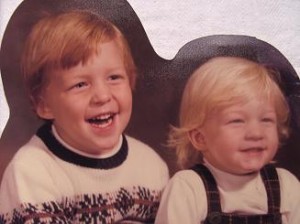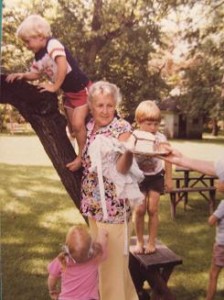When Nelson was three and Lars two, we lived near a busy shopping mall. I was pregnant with Linnea, looking for ways to use up the boundless energy of two little boys with the hope they’d nap during the afternoon. Once in a while we’d head for the mall, just to play. There were carpeted pits with giant steps for climbing, interesting drinking fountains, a pet store window to watch the animals and an ice cream shop with free tasting.
One snowy day we were at the mall, and the boys were playing happily in the pits while I was window shopping nearby. When Lars arrived at my side asking, “Where Neldo?” I knew we were in trouble.
I glanced down both ends of the long center hall but didn’t see his red hair anywhere. Grabbing Lars’ hand, we loped along as fast as his toddler legs could go, popping into each store along the way. My heart pounded. How could I be so irresponsible about watching the boys?
At a suggestion by one of the clerks, we ran down a narrow hall to the mall offices where we found a security guard with his feet up. “My little boy’s lost! Hurry! He could be anywhere!”
The guard asked several questions before getting up but finally said, “Don’t worry. Usually they go out to the car.”
This was cause for worry, since we were parked in a busy lot where drivers weren’t watching for a small boy darting between cars. A second worry was the icy December day, because I was holding Nelson’s jacket. But he wasn’t outside, so we followed the guard back to his office. “I’ll page him for you,” he said. “Where shall I tell him to meet you?”
This was a three year old! Would Nelson understand, “Report to the security office, Room 102”? If he had wandered to another part of the mall, he’d be like a mouse in a maze trying to find his way back.
My mind raced in an effort to think like a three year old, and my back hurt with the heavy two year old now on my hip. “Tell him to go to the carpeted steps,” I told him, pushing back a horrifying picture of Nelson already in the back seat of a stranger’s car.
As the guard paged Nelson, we heard his message broadcast on loudspeakers, after which Lars and I raced for the pit. Time ticked away. Without a sign of Nelson, I remembered the Walmart-style store at the far end of the mall with its broad, inviting entrance. Grabbing Lars, I jogged the length of the mall, holding back tears. How could I let this happen? What would I tell Nate? Where, oh where was Nelson!
As we approached the store I could see the check-out registers. Sitting atop one of them, conversing with a young woman, was our little boy in his green corduroy pants and checkered sweater, swinging his snow boots back and forth. Grabbing him and squeezing him tight, I cried, “Nelson! Where were you? Oh, I’m so sorry you got lost!”
“I’m not lost, Mama. I’m here,” he said, “and guess what! I was on the radio! They said me on the radio!”
I felt like a big balloon that had just been popped by a long pin as the breath I’d been holding came whooshing out. We put on our coats and headed for home. As far as Nelson was concerned, it’d been a fantastic morning.
Today I spent an hour talking to God and then paused to hear him, listening for his page. It’s hard to be quiet long enough to let him speak, but I kneeled and waited. Henry Blackaby says that after we’ve prayed, we should remain silent but pay close attention to our next thought.
After several minutes, the words “I am able” flooded my mind, and I knew the Lord was paging me. “Now all glory to God, who is able, through his mighty power at work within us, to accomplish infinitely more than we might ask or think.” (Ephesians 3:20)
In those three words, “I am able,” God was telling me he will cover my inabilities with his abilities, and things will work out ok. More than ok, they will be stunning, extravagant, brilliant! Unlike little Nelson who strayed from his parent, I’m planning to stay close to my Father, because when he does what he says he’ll do, I want to be right next to him!
“He is able even to subdue all things unto Himself.” (Philippians 3:20)



